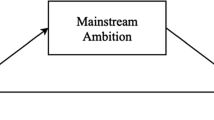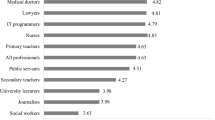Abstract
Research has long suggested that higher education leads to liberalisation in students’ sociopolitical orientations (e.g., Feldman & Newcomb, 1969; Newcomb, 1943/1957; Pascarella & Terenzini, 1991). Differences in level of liberalisation depending on academic discipline have also been found (e.g., Baer & Lambert, 1982; 1990; Guimond & Palmer, 1990; 1996). Two hypotheses have been proposed to explain these differences: self-selection, where people choose disciplines whose views most closely match their own; and socialisation, where people’s belief systems change to match their discipline’s. Two key mechanisms are thought to drive socialisation: normative (people’s attitudes change to match those around them) and informational influences (provision of specific knowledge creates attitude change). This paper reviews the major evidence of liberalisation of students’ orientations, as well as evidence for the self-selection and socialisation explanations, and for normative and informational influence. It concludes with suggestions as to how future researchers can investigate whether change occurs and the processes by which this may be occurring.
Résumé
De nombreuses recherches ont proposé que l’enseignement supérieur conduit à une liberalisation des orientations sociopolitiques des étudiants (i.e., Feldman & Newcomb, 1969; Newcomb, 1943/1957; Pascarella & Terenzini, 1991). Des influences différentes selon la discipline accadémique ont aussi été observées (i.e., Baer & Lambert, 1982, 1990; Guimond & Palmer, 1990, 1996). Deux hypothèses principales ont été mises en avant pour expliquer ces résultats: l’effet de sélection, impliquant le choix d’une discipline congruente avec nos croyances; et l’effet de socialisation, impliquant des changements de croyances dans la direction de celles prévalant dans la discipline. Deux principaux mécanismes peuvent conduire à des effets de socialisation: l’influence sociale normative basée sur le rôle des normes sociales ambiantes et l’influence sociale informationnelle basée sur l’acquisition de connaissances. Cet article fait la revue des principales études dans ce domaine et propose des pistes de recherches futures afin d’établir dans quelle mesure, et par quels mécanismes, les changements d’attitudes et de croyances peuvent se produire sous l’influence de l’enseignement supérieur.
Similar content being viewed by others
References
Alwin, D.F., Cohen, R.L., & Newcomb, T.M. (1991).Political attitudes over the life span: The Bennington women after 50 years. Wisconsin: University of Wisconsin Press.
Apparala, M.L., Reifman, A., & Munsch, J. (2003). Cross-national comparison of attitudes toward fathers’ and mothers’ participation in household tasks and childcare.Sex Roles, 48, 189–203.
Astin, A.W. (1979).Four critical years: Effects of college on beliefs, attitudes, and knowledge. San Francisco: Jossey Bass.
Baer, D.E., & Lambert, R.D. (1982). Education and support for the dominant ideology.Canadian Review of Sociology and Anthropology, 19, 173–195.
Baer, D.E., & Lambert, R.D. (1990). Socialization into dominant vs. counter ideology among university-educated Canadians.Canadian Review of Sociology and Anthropology, 27, 487–504.
Brand, P.A., & Anastasio, P.A. (2005). Heart follows head: Influencing violence-related attitudes in the classroom.Social Psychology of Education, 8, 395–405.
Cheung, C., & Kwok, S. (1998). Social studies and ideological beliefs in mainland China and Hong Kong.Social Psychology of Education, 2, 217–236.
Curtis, J.E., & Lambert, R.D. (1976). Educational status and reactions to social and political heterogeneity.Canadian Review of Sociology and Anthropology, 13, 189–203.
Cutler, S.J., & Kaufman, R.L. (1975). Cohort changes in political attitudes: Tolerance of ideological nonconformity.Public Opinion Quarterly, 39, 69–81.
Dambrun, M., Guimond, S., & Duarte, S., (2002). The impact of hierarchy-enhancingvs. attenuating academic major on stereotyping: The mediating role of perceived social norm.Current Research in Social Psychology, 7, 114–136.
Duckitt, J., (2006). Differential effects of RWA and SDO on outgroup attitudes and their mediation by threat from and competitiveness to outgroups.Personality and Social Psychology Bulletin, 32, 684–696.
Eagly, A.H., & Chaiken, S. (1993).The psychology of attitudes. Orlando: Harcourt Brace Jovanovich.
Feldman, K.A., & Newcomb, T.M. (1969).The impact of college on students: An analysis of four decades of research. London: Jossey-Bass.
Finney, H.C. (1974). Political dimensions of college impact on civil-libertarianism and the integration of political perspective: A longitudinal analysis.Sociology of Education, 47, 214–250.
Fleishman, J.A. (1986). Types of political attitude structure: Results of a cluster analysis.Public Opinion Quarterly, 50, 371–386.
Gamson, Z.F. (1967). Performance and personalism in student-faculty relations.Sociology of Education, 40, 279–301.
Guimond, S. (1999). Attitude change during college: Normative or informational social influence?Social Psychology of Education, 2, 237–261.
Guimond, S., & Palmer, D.L. (1990). Type of academic training and causal attributions for social problems.European Journal of Social Psychology, 20, 61–75.
Guimond, S., & Palmer, D.L. (1994). The politics of Canadian social scientists: A comment on Baer and Lambert.Canadian Review of Sociology and Anthropology, 31, 184–195.
Guimond, S., & Palmer, D.L. (1996). The political socialization of commerce and social science students: Epistemic authority and attitude change.Journal of Applied Social Psychology, 26, 1985–2013.
Guimond, S., Bégin, G., & Palmer, D.L. (1989). Education and causal attributions: The development of “person-blame” and “system-blame” ideology.Social Psychology Quarterly, 52, 126–140.
Guimond, S., Palmer, D.L., & Bégin, G. (1989). Education, academic program, and intergroup attitudes.Canadian Review of Sociology and Anthropology, 26, 193–216.
Guimond, S., Dambrun, M., Michinov, N., & Duarte, S. (2003). Does social dominance generate prejudice? Integrating individual and contextual determinants of intergroup cognitions.Journal of Personality and Social Psychology, 84, 697–721.
Halsey, A.H., & Trow, M.A. (1971).The British academics, Faber & Faber: London.
Hastie, B. (2007). Cold hearts and bleeding hearts: Disciplinary differences in university students’ sociopolitical orientations.Journal of Social Psychology, 147, 211–241.
Huddy, L. (2004). Contrasting theoretical approaches to intergroup relations.Political Psychology, 25, 947–967.
Jennings, M.K., & Niemi, R.G. (1981).Generations and politics: A panel study of young adults and their parents. New Jersey: Princeton University Press.
Johnson, S.D., & Tamney, J.B. (2001). Social traditionalism and economic conservatism: Two conservative political ideologies in the United States.Journal of Social Psychology, 141, 233–243.
Krosnick, J.A., & Alwin, D.F. (1989). Aging and susceptibility to attitude change.Journal of Personality and Social Psychology, 57, 416–425.
Ladd, E.C., & Lipset, S.M. (1975).The divided academy: Professors and politics. New York: Norton Library.
Lottes, I.L., & Kuriloff, P.J. (1994). The impact of college experiences on political and social attitudes.Sex Roles, 31, 31–54.
Macalister, H.E. (1999). Women’s studies classes and their influence on student development.Adolescence, 34(134), 283–292.
Marginson, S. (1997).Educating Australia: Government, economy and citizen since 1960. Cambridge: Cambridge University Press.
McClosky, H. (1958). Conservatism and personality.American Political Science Review, 52, 27–45.
Newcomb, T.M. (1943/1957).Personality and social change: Attitude formation in a student community. New York: Dryden Press.
Newcomb, T.M., Koenig, K.E., Flacks R., & Warwick, D.P. (1967).Persistence and change: Bennington college and its students after twenty-five years. New York: John Wiley.
Pascarella, E.T., & Terenzini, P.T. (1991).How college affects students: Findings and insights from twenty years of research. San Francisco: Jossey-Bass.
Peterson, B.E., & Lane, M.D. (2001). Implications of authoritarianism for young adulthood: Longitudinal analysis of college experiences and future goals.Personality and Social Psychology Bulletin, 27, 678–690.
Phelan, J., Link, B.G., Stueve, A., & Moore, R.E. (1995). Education, social liberalism, and economic conservatism: Attitudes toward homeless people.American Sociological Review, 60, 126–140.
Plant, W.T. (1966). Changes in intolerance and authoritarianism for sorority and nonsorority women enrolled in college for two years.Journal of Social Psychology, 68, 79–83.
Rubinstein, G. (1997). Authoritarianism, political ideology, and religiosity among students of different faculties.Journal of Social Psychology, 137, 559–567.
Sandys, M. (1995). Attitudinal change among students in a capital punishment class: It may be possible.American Journal of Criminal Justice, 20, 37–55.
Sears, D.O. (1983). The persistence of early political predispositions: the roles of attitude object and life stage. In L. Wheeler (Ed.),Review of personality and social psychology (vol. 4, pp. 79–116). Beverley Hills: Sage.
Sidanius, J., & Pratto, F. (1999).Social dominance: An intergroup theory of social hierarchy and oppression. Cambridge: Cambridge University Press.
Sidanius, J., van Laar, C., Levin, S., & Sinclair, S. (2003). Social hierarchy maintenance and assortment into social roles: A social dominance perspective.Group Processes and Intergroup Relations, 6, 333–352.
Spaeth, J.L., & Greeley, A.M. (1970).Recent alumni and higher education: A survey of college graduates. New York: McGraw-Hill.
Society (1998). College students value money over mind.35, 3–4.
Wasburn, P.C. (1970). Some political implications of students’ acquisition of social science information.Social Forces, 48, 373–383.
Weil, F.D. (1985). The variable effects of education on liberal attitudes: A comparative historical analysis of anti-Semitism using public opinion survey data.American Sociological Review, 50, 458–474.
Wilson, G.D., & Caldwell, F. (1988). Social attitudes and voting intentions of members of the European parliament.Personality and Individual Differences, 9, 147–153.
Zagórski, K. (1988). Australian ‘left’ and ‘right’ (Social composition and ideological integrity).Politics, 23, 90–100.
Author information
Authors and Affiliations
Rights and permissions
About this article
Cite this article
Hastie, B. Higher education and sociopolitical orientation: The role of social influence in the liberalisation of students. Eur J Psychol Educ 22, 259–274 (2007). https://doi.org/10.1007/BF03173425
Received:
Revised:
Issue Date:
DOI: https://doi.org/10.1007/BF03173425




